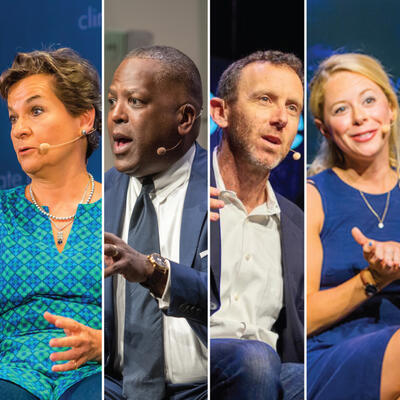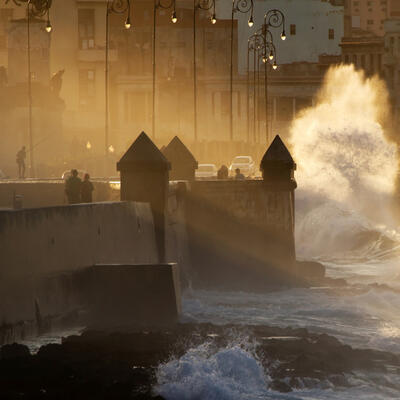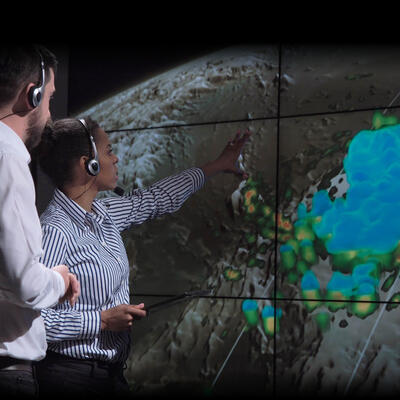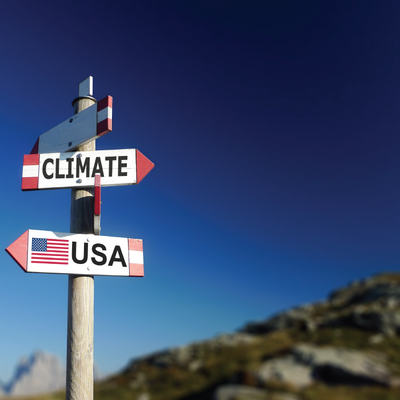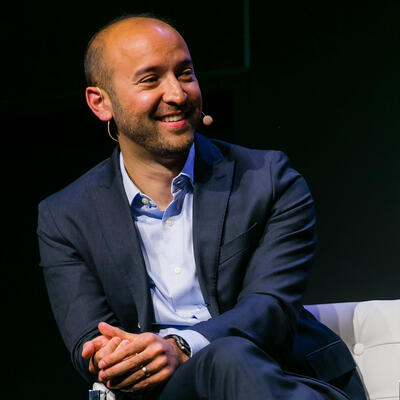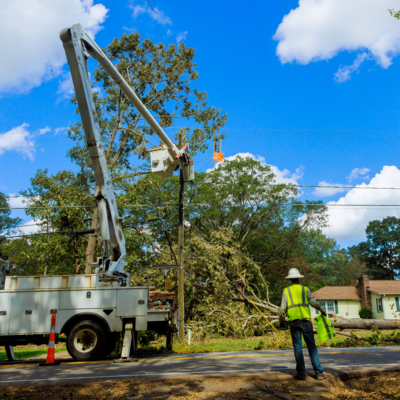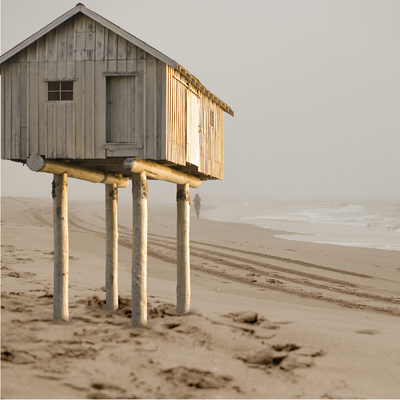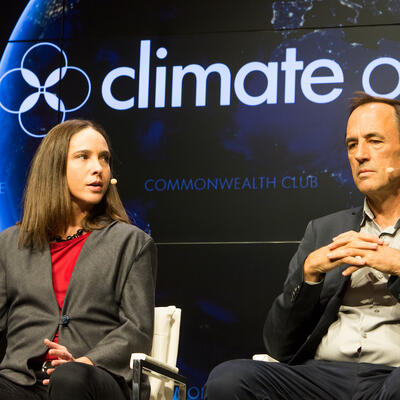
Jeff Goodell: The Water Will Come
Guests
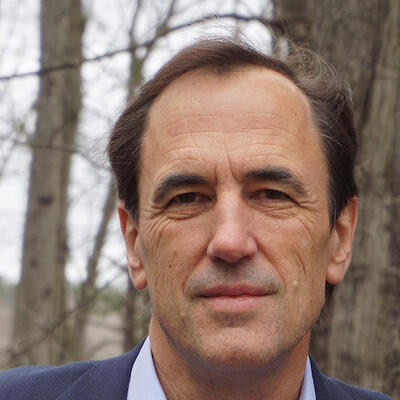
Jeff Goodell
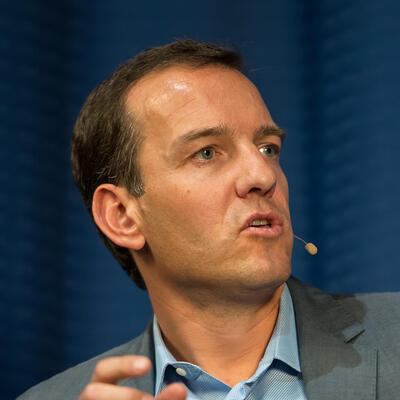
Marco Krapels
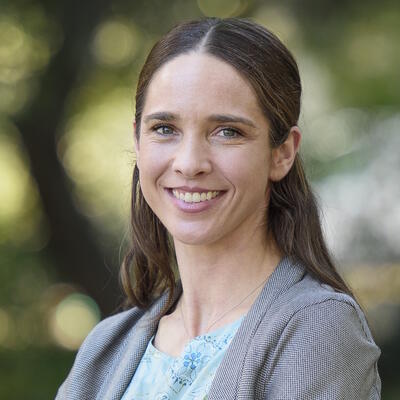
Katharine Mach
Summary
Rising waters represent the most visible and tangible impact of climate disruption. Protecting people and property from all that water, while simultaneously ensuring billions have enough to drink, will have unfathomable costs and alter the lives of most people living on earth.
Jeff Goodell, Author, Contributing Editor, Rolling Stone
Marco Krapels, Former VP, Tesla; Producer, Before the Flood
Katharine Mach, Senior Research Scientist, Stanford University
This program was recorded in front of a live audience at the Commonwealth Club in San Francisco, CA on November 8, 2017.
Full Transcript
Announcer: This is Climate One, changing the conversation about energy, economy and the environment.
We know that melting icecaps are causing the world’s oceans to rise. But for those of us who don’t own beachfront property, it may be hard to fathom the consequences of a few feet of water. Recent extreme weather events like Sandy, Harvey and Irma have given some U.S. cities a hint of what might be in store.
Jeff Goodell: One way to think about this is as a kind of dress rehearsal for sea level rise. I mean imagine this kind of water coming in and instead of just spending a couple of hours there and going out the way it did with Sandy, it stayed in.
Announcer: But even as the people of Puerto Rico struggle with the aftermath of Hurricane Maria, some see an opportunity.
Marco Krapels: Why don't they make loans available so people can afford and purchase their own energy systems, which comes from a sustainable and a renewable source, and Puerto Rico is going to have sunshine for the next 5 billion years that is not gonna run out.
Announcer: Rising seas, sinking cities, and the future of our planet. Up next on Climate One.
Announcer: The tide is high – and getting higher. Are we prepared for an increasingly watery world?
Welcome to Climate One – changing the conversation about America’s energy, economy and environment. Climate One conversations – with oil companies and environmentalists, Republicans and Democrats – are recorded before a live audience and hosted by Greg Dalton.
Jeff Goodell’s new book on sea level rise is titled “The Water Will Come.” But according to experts, it’s already here – oceans have risen by six to eight inches in recent decades. By some estimates, our seas could rise between three and eight feet by the end of this century, threatening hundreds of coastal cities and possibly wiping out entire island nations.
On today’s program, we welcome author and Rolling Stone contributor Jeff Goodell to discuss his book. We’re also joined by Katharine Mach, senior research scientist at Stanford University, and former co-director of science for the Intergovernmental Panel on Climate Change, and Marco Krapels, former vice president of Tesla and co-producer of the documentary Before the Flood.
Here’s your host, Greg Dalton.
Greg Dalton: Jeff Goodell, let's begin with you. You opened your book saying that you had written about climate change, but when hurricane Sandy slammed into New York City it became a visceral issue for you. So tell us how that hit you in the gut.
Jeff Goodell: Well, you know, I have been writing about climate change for a long time, and I'd heard about sea level rise, I kind of knew about it the way that, you know, one knows about these things that you read about. But it was never a kind of urgent issue to me and then when Sandy hit, I wasn't in the city but I went down the right afterwards and seeing all the, you know, we got about 9-foot of storm surge into lower Manhattan. (0:06:18)
And I went down there and was walking around the streets, you know, seeing the water still in the cars and, you know, people hauling soggy furniture out of their apartments and the smell, you can already smell the mold. And it was just, you know, it’s just very visceral feeling of what water can do to a place. And as a journalist, I was thinking about how to cover this, how to write about this and I knew I had to write about it. I was talking to some scientists at Columbia and one scientist said to me, you know, one way to think about this is as a kind of dress rehearsal for sea level rise. I mean imagine this kind of water coming in and instead of just spending a couple of hours there and going out the way it did with Sandy, it stayed in. And that was a pretty mind blowing thing and he said, well if you -- I told him that, I said it’s a pretty mind blowing idea. And he said, well if you really want to blow your mind, go down to Miami and think about that.
And so I did and I went to Miami and I happened to get there at king tides, which is the annual high tide for the region. And I was walking through 3 feet of water in Miami Beach on just a regular king tide kind of day. And I thought about it for a few minutes literally, and you realize that, you know, most of Miami-Dade County is 6 feet above the sea. It's built on a kind of porous limestone, making it very difficult to build any kind of walls and I realized that Miami was a city in big, big trouble. And that was sort of where the book began right there.
Greg Dalton: Katharine Mach, what can science tell us about how fast the sea level rise will happen? Because a lot of people think of sea level rise as like this very slow moving thing that'll be a problem for my grandkids. But what do we know about Antarctica and Greenland, how fast it will happen?
Katharine Mach: Before we jump to how fast it might happen, I might just say that it’s already happening and superstorm Sandy when it struck New York City in October of 2012 hit shore on top of 1 foot of sea level rise. And the key question of when we think about what’s happened to date versus what might happen into the future is that there are different processes at play. So warmer ocean takes up more space and ice is melting from land and also from the ice sheets. But the really big question about risk is exactly how fast the ice sheets might collapse. So the West Antarctic and Greenland don't just melt on the surface, they flow through time. And what we're doing with our missions of heat trapping gases is the amount of force in that normally might happen between an interglacial and in glacial cycle and they’re incredibly important questions about how much faster those processes might play out over the next two decades and the next few centuries.
Greg Dalton: Okay. So we’re not sure. What are the ranges for someplace like California, the east coast. What are we looking at like a timeframe; give me a timeframe when I think I’ll be alive and not 2100.
Katharine Mach: Okay. So today, there have been eight inches of sea level rise globally. U.S. is pretty much at the global average, Alaska has more intensity because of the ice and permafrost and the eastern seaboard is seeing a bit more than that. In the next 15 years, we might see another half foot of sea level rise so a substantial increase in the rate at which the oceans are rising. Stepping through this century when I guess I won’t be alive in 2100, but the risk at that point is best estimates around 1 to 4 feet of sea level rise globally. But if the ice sheets move faster rather than slower that upper bound could be up to 8 feet at the global scale.
Greg Dalton: Eight feet. Jeff Goodell, are we anywhere prepared for 8 feet or even 3 feet?
Jeff Goodell: 8 feet, no. I mean just imagine what 8 feet of sea level rise means. We were just talking a few minutes ago that there’s already flooding on 101 around here, places in Miami are already inundated, Norfolk, I mean many places are already dealing with this. So even small amounts are usually consequential, 8 feet is, I mean I don’t want to be melodramatic, but that's catastrophic.
I mean there’s just no scenario in which a modern city can be prepared for that. But even these midrange scenarios of three or 4 feet is really important to see. The thing about sea level rise is it doesn't have to be gargantuan to have enormous problems with beaches washing away, with roads eroding. The costs for communities to deal with this, property values declining at exactly the time when they need to spend more money on adaptation. The economic kind of downward spiral that can be caused by even modest amounts of sea level rise is usually consequential. And will begin to play out long before these big numbers get hit. I mean even in the next few decades, even now we’re seeing it in places in Florida where, you know, they're spending instead of $10 million every two years to replenish the beaches they’re spending $50 million. And, you know, where is that money coming from? And every inch of sea level rise increases that erosion rate increases the, you know, washing away of roads and incursion into buildings and things like that. So it's a progressive problem.
Greg Dalton: Sea level rise amplifies big storms, hurricanes, cyclones, Katharine Mach, tell us about we’ve been through Harvey, Irma, we’ve talked about Sandy, also Maria, what is the climate connection with these and what can they tell us about the intensity and frequency in the future?
Katharine Mach: Cyclones are complex phenomena in our climate system. So it helps to break it down to some simple ways of thinking about the connections between our emissions of heat trapping gases and how these events have become more intense in the North Atlantic and how they might continue to become more intense. So first of all, when the ocean surface is warmer and also when that warmer water goes deeper, you can drive the creation of more powerful storms. Second key feature is that a warmer atmosphere can hold more water, which means that it can come down in heavier rainfall events. And then the third point is where we were at the start, is the fact that when waves are striking shore from a hurricane oftentimes where you get the largest damage is those waves are striking shore on top of sea level rise which is amplifying the risks.
Greg Dalton: So more fuel in the air and more fuel in the water, bigger storms. We saw the rain bombs in Houston also, Puerto Rico has been devastated. Marco Krapels, you've been to Puerto Rico. Tell us how the devastation there can also be an opportunity.
Marco Krapels: Yeah, we went to Puerto Rico with my foundation Empowered by Light and basically Puerto Rico is being wiped out. There is no grid. That's an opportunity rebuild the grid for the future and, you know, I’m gonna try not too much of a downer in this session.
You know, I just want to take a quick step back four years ago when I was last with you on a panel like this, we didn’t have electric cars on the road. Solar cost on a per panel base is still $.80 a watt. And utility scale solar to develop cost about $1.50 a watt. Today, four years later, we’ve seen a lot of electric cars. Tesla is not the only one anymore which is great. You know, every major car manufacturer, Mercedes, Audi, Volkswagen, everyone, Volvo decided to phase out all petrol cars by 2025. So we’ve seen in the last four years electric cars really taken hold and we’re not dependent on one company anymore. We’ve seen the cost of solar drop by somewhere between 30% and 50% and which means that in places like Puerto Rico, which are completely devastated by the way, there is no grid, every transformer is burned down. The polls are broken down, the utilities under FBI investigation. It is a complete disaster which gives us a complete white canvas to rebuild the infrastructure that we need which is about empowering people to make their own energy to store it, to use what they need and to sell what they don't need.
And to create microgrids that are powered by renewable energy and instead of the federal government sending more money to buy more diesel which is going to run out, why don't they make loans available so people can afford and purchase their own energy systems, which comes from a sustainable and a renewable source in Puerto Rico is going to have sunshine for the next 5 billion years that is not gonna run out. So I think there is and, you know, there's a lot of negative news out there, but there's also an opportunity with the technology that we have available today that are affordable. They're cheaper than diesel guaranteed to basically incubate a model for the future.
Greg Dalton: Jeff Goodell, there's a lot of inertia to rebuild communities the way they were after a devastating, you know, Sandy, people want to rebuild the Jersey shore. I just want my home to be the way it was. I want my life back. What are some of the inertia to rebuild the way it was and what are some of the forces to rebuild smarter differently like Marco Krapels just outlined?
Jeff Goodell: Before I answer that I want to say one thing that’s really important what Marco is saying about is, you know, how we move quickly towards renewable energy and cut carbon emissions is incredibly important. But I think there's a big fallacy out there that if we move quickly enough we can stop sea level rise and that we can eliminate this problem and it’s just a question of how fast we move to renewable power, that’s not the case. No matter how fast we move to renewable power we’re still gonna have sea level rise. We can change the trajectory of it. We can change the ultimate height of it, but we still have to have this conversation about dealing with it because we’re already too far down that path. We already have enough heat buildup in the oceans and things that we’re going to see these rising seas. That doesn’t mean again to underscore that we don't have to cut carbon emissions as quickly as possible for a lot of reasons. But I think that there’s a fallacy that we can kind of fix this in a straightforward way and it's not true.
Greg Dalton: You slam on the brakes on a supertanker that supertanker keeps moving for a while.
Jeff Goodell: Exactly. Exactly. Alright. So about the rebuilding I mean, you know, there’s tremendous inertia in these coastal communities after a big storm, especially when you have, you know, a Trump administration, to rebuild it the same way. The contractors come in and they're not like Marco who are brilliant people who are thinking in a profound way about these risks and want to really use this as an opportunity to change the world. Many people who rebuild after storms are people who see this as an opportunity to make a buck and that's a whole different scenario. And that's what we see happening in a lot of places. I saw that after Hurricane Sandy on the Jersey shore.
So, you know, it really requires sort of visionary thinkers to seize these moments and say okay this is a time when we can use this opportunity to change where we build. And with sea level rise and storms one simple thing that does happen and will certainly happen a lot more is buying out communities and returning them to nature. We did that in couple of neighborhoods on Staten Island and there are going to be places where that’s gonna be the sort of solution after a rebuild is to say we’re not gonna rebuild at all. This is going back to nature.
Greg Dalton: Katharine Mach, how are we gonna decide who gets protected and what areas get abandoned?
Katharine Mach: We have a very clear understanding that managing the risks in a changing climate is gonna require a big portfolio of actions. And so when I think we dive in right to this question of retreat we need to step back and say how does that fit into the whole landscape of what we’re doing. And so some of the responses will be engineered. We need to adopt what the Dutch have done and figure out dikes and barriers. But also like the Dutch have done we need to figure out how even nature can be a part of that, where we want to create floodplains. And then in part of that we need to say where there are places that are so at risk that for example The National Flood Insurance has paid $1 million to a house that is worth $70,000; those are the types of places where we need to be stepping in either through buyouts or through community relocations or through strategic adjustments of our infrastructure and create more room for the river in some really important ways coming together with the stuff that's protection, the stuff that’s accommodation and the stuff that's moving out of harm's way in the entirety.
Greg Dalton: Jeff Goodell, you write about living differently with water and not fighting it, but kind of a new relationship with water.
Jeff Goodell: Yeah, well that’s something the Dutch are figuring out. They have this new idea, you know, they’ve obviously, you know, what 70% of the Netherlands is as you know better than I is below sea level. And they’ve, you know, constructed this world that is protected by walls and dikes, but they're even figuring out that given the kind of sea level rise projections were talking about they can’t continue that, that's not, building walls, simply walling off the water is not going to work. So the Dutch are really sort of forward thinking in this idea of we have to live with water we have to figure out new ways of living with water. The future is going to require kind of adaptable living. You know, I think that's one of the profound ideas about sea level rise that I try to communicate in my book is that we have this sense of our coastlines as being these fixed places that where you build a house there, you put a road there and that's where the beaches and that’s where the water is and here's where the land is. Well, the thing that we know now is that that is going to be changing very rapidly. And in fact, you know, that’s the way nature creates coastlines; they’re all temporary arrangements of sort of sand and rock. And, you know, we have to live in a way that embraces that and reflects that. You know, when I saw that in some of the, you know, in places like Lagos where I went and looked at people who are living in water slums there and, you know, they're living in houses that are on stilts and you talk to them about sea level rise and they’re like, I don't care if it rises four feet I’ll just put bigger stilts up and we’re fine because everything is on a boat and there's no built infrastructure.
Greg Dalton: You write about a school, a floating school there.
Jeff Goodell: Yeah, and it’s a great thing and it was a very cheap they just basically, there’s a Nigerian architect a really brilliant man, you know, basically lashed together a bunch of oil drums and built like a tepee on top of it, a sort of fancy tepee and it was fabulous and it was the community center and it was two levels high and everybody loved it and it really was a sort of epicenter of this slum community. It was really inspiring for everyone; it's why I went there. And seeing the resiliency in this sort of simpler way of living was really inspiring to me too because it really showed me that it’s really like how we think about it more than anything else that is their biggest stumbling block. That if we can think about this in more creative and flexible ways, it’s not as scary.
Greg Dalton: If you’re just joining us we’re talking about sea level rise at Climate One. Our guests are Jeff Goodell, author of the new book The Water Will Come. Katharine Mach, a scientist from Stanford University and Marco Krapels, a former vice president of Tesla. I'm Greg Dalton.
Earlier when President Obama went to Alaska, Jeff Goodell traveled there and spoke with President Obama about the impact of climate disruption. Here’s a part of their conversation.
[Start Clip]
Barack Obama: You wish that the political system could process an issue like this just based on data and science. But people have to see it and feel it and breathe it. And that makes things a little scarier because it indicates that we’re already losing a lot of time.
Our democratic process is painfully slow. Historically, politics catch up when the public cares deeply. The American people have to feel the same urgency that I do. It’s understandable that they don’t because it feels abstract to people.
[End Clip]
Dalton: President Obama talking to Jeff Goodell in Alaska, Rolling Stone writer Jeff Goodell. So Jeff Goodell, tell us about that time that interview. He was trying to lay out his legacy there and saying that also that gotta reach people at a visceral level.
Jeff Goodell: Right. I mean he went up there in order to communicate with people about this. He went to Alaska where it’s the sort of poster child for both our dependency on fossil fuels and the risks of global warming and the melting that’s going on there the permafrost and everything and displaced villages. And I was lucky enough, you know, he basically chose one writer to go with him to spend a few days with him and for reasons that you’d have to talk to them about, they asked me if I wanted to go.
Greg Dalton: You’re one of the best.
Jeff Goodell: But I got the extraordinary opportunity not only to kind of climb around on glaciers with the president, but to spend an hour and a half sitting in a eighth grade classroom in the Arctic Circle just him and I talking about climate change.
Greg Dalton: No one gets that kind of time with that guy.
Jeff Goodell: Yeah, it was very pretty good news. You know what’s really extraordinary was that I've interviewed many people in my life as a journalist and whenever you interview someone of prominence they always want to know what -- the aides always want to know what are you going to ask so that the important person is not surprised by some weird question you’re gonna spring on them. Nobody asked me, all they said is, you have an hour and a half with the president to talk about climate change and that’s all. And there was no like, are you gonna ask him about glaciers, are you gonna ask him about, you know, there was no prep.
So I had him completely, he had no idea what I was gonna ask him. And I have after all these years I have a very good sort of BS detector for people who understand climate change and energy questions and people who have read a lot of notes about it, and there's a big difference and he got it. He really understood what was at risk and what was happening. I don’t agree with everything that he said, but it was really an extraordinary moment and it led to an extraordinary thing, which was the Paris climate agreement. And that was the whole point of that to bring the American public along. He worked very hard, he and Secretary Kerry to bring the Chinese on board to get this coalition together that came together and achieve what happened in Paris. And I was in Paris and it was very emotional moment, everyone next to me was crying when the gavel went down.
And now in retrospect, it seems like some other world. It's like, you know, a long-lost past.
Announcer: That’s journalist and author Jeff Goodell, and we’re talking about rising seas, here on Climate One. We’ll continue the conversation right after this.
Announcer: Welcome back to Climate One. Today, we’re talking about rising seas – why it’s happening, what it means to our coastlines and what we can do about it. Our guests are author Jeff Goodell, former Tesla vice president Marco Krapels, and Katharine Mach of Stanford University. Here’s Greg Dalton.
Greg Dalton: Katharine Mach, there's some interesting research that shows what reaches people. President Obama is saying former President Obama but then President Obama saying need to reach people at a visceral, emotional level. Tell us about some research that you're aware of that says how that can happen with regard to climate.
Katharine Mach: Climate change is an awesome challenge in so many different ways. Responding effectively is going to require proactive transformation of our energy and land use systems globally in this century. That’s where we’re grappling with in reality, but what we often do as scientists is kind of the worst way to connect with people and drive the kind of creativity and innovation and leadership that's necessary to solve that awesome challenge. So what we usually do scientifically is we take it from the top. We talk about carbon dioxide and nitrous oxide and methane and the way they’re shifting the radiative balance of the planet. And if people haven’t tuned out at that point we then march through this long litany of risks, not just what's happening in the climate system but bam, bam, bam you can go continent by continent, people, nature how this is a pervasive challenge for every aspect of our existence. So at that point most people are either elevated and their pulse slightly alarmed or they have just completely disengaged. What we know from the science of how to do communications effectively is that you don't start with creating an abstract, unfixable, unending challenge in your communications narrative, you connect with people.
And Obama had it exactly right. You start with the fact that yes, it's real, it’s happening, it’s serious, but we see solutions happening in so many different ways. And if you’re gonna hit people with the risk you want to make sure they see how it connects to them, here and now, how it’s urgent and how they can solve it. Again and again scientifically we haven’t quite figure out how to make that happen but I think there’s enough recognition at this point that whether it's the IPCC or the NCA or scientists at every university there is increasing determination to get the communications and engagement right.
Greg Dalton: There’s an acronym that I learned from George Marshall who wrote a book called Don't Even Think About It, what we think about when we’re not thinking about climate change. And in there he cites PAIN to reach people. It needs to be personal, abrupt, immoral, and now - all the things that climate change in its abstraction is not. So Marco Krapels, you work a lot with Leonardo DiCaprio there's a Solutions Project. Tell us about that effort to try to get to and using his celebrity to communicate to reach people who may not be paying attention to scientists like or others.
Marco Krapels: Sure. And by the way, I really do miss President Obama. I just want to say that. Boy, the world has changed
But, but, the world is still moving forward with or without us. China right now is deploying solar at twice the rate that we are deploying solar. And sooner it’ll be a three times the rate. India, Modi, I had the privilege of meeting Prime Minister Modi when he came here to Silicon Valley. And he’s made a huge commitment to solar and powering his country with renewable energy. So with Leo, yeah, I think one of the reasons why we want to make Before the Flood, the documentary is to try to find a way to reach more people.
And National Geographic end up picking up the movie and it was great that they screened it for free on various media outlets for two weeks. I think over 80 million people ended up watching it just in the first few weeks. And, you know, unfortunately we weren’t able to swing the elections. But, you know, I do think it's important that public figures and Leo has done a great job, Mark Ruffalo has done a great job as well are reaching out to their followers and their people and letting them know that this is important, vote and please adopt renewable energy technology as much as you can. So Leo has been amazing, he’s been a big supporter of the Solutions Project as well and, you know, it's great when you see people like Bernie Sanders as part of his campaign take the hundred percent renewable energy platform as his energy plan. I mean that is incredible. I mean we didn’t see that one coming either.
Greg Dalton: And there's been some talk about a national policy for the state of California at 50% trying to go to 100% but there's been an interesting backlash to this, you know, Professor Mark Jacobson, engineering professor at Stanford published a paper we can get to 100% in California and some very green people pushed back on that and now there's a lawsuit. So tell us about that Marco.
Marco Krapels: Yeah, so I mean I’m not party to the lawsuit, but Dr. Jacobson who’s the cofounder of the Solutions Project with myself and Mark Ruffalo and Josh Fox. He, a few years ago published a paper doing scientific analysis of what technologies are available to transition ourselves to 100% renewable. And he focused on pumped hydro as an important storage source. So I think he was upset that there were factual errors made in certain publications, and when he attempted to get those corrected and not getting response to that and he did reach out to various of those authors and he didn't get a response. So I think he decided to file a lawsuit to get their attention.
And so, you know, the good news is, is that there are many other technologies available today to store energy. I mean the cost of batteries has dropped over 50% the last four years. So we’re not necessarily dependent on stored hydro or pumped hydro using a lot of turbines to create that energy during peak hours. The beautiful thing about renewable energy is you can harvest the sun; you can harvest the wind and create cheap energy. The problem is that's intimate and it's only during certain parts of the day. And our peak demand in California is in later hours in the day in the evening when we needed energy most.
So you need some formal storage to be able to store what you generate during the day and be able to discharge that at night. The good news is, is that batteries are there so there’s a reason why company like Tesla are building massive storage projects coupled to solar, coupled to wind in parts of the world not because people think it's the right thing to do it’s because it's cheaper than any other source of energy. And so I think the good news for Dr. Jacobson and any other scientist looking at how we transition to 100% renewable is that there are other forms of storage that are available that are economically feasible that can be integrated with intermittent sources of new energy like wind and solar to get us to a 100% renewable. And I really hope that SB 100 the California effort that’s on the way to get ourselves to a 100% renewable energy faster gets passed next year and then California can lead again with or without the rest of the United States.
Greg Dalton: Marco Krapels is a former vice president of Tesla. Our other guests today at Climate One are Katharine Mach, research scientist at Stanford University and Jeff Goodell, author of the new book The Water Will Come. I'm Greg Dalton.
We’re gonna go to our lightning round. I’m gonna mention a noun to each of our guests and get their immediate visceral, unfiltered response association and also a true and false part of this. Starting with Jeff Goodell, what’s the first thing that comes to your mind when I mentioned Norfolk, Virginia?
Jeff Goodell: Sunken ships.
Greg Dalton: Marco Krapels. Warren Buffett.
Marco Krapels: Nevada.
Greg Dalton: Katharine Mach. President Trump’s science advisor.
Katharine Mach: What science advisor?
Greg Dalton: He does not have one. Jeff Goodell, U.S. Secretary of Interior Ryan Zinke.
Jeff Goodell: A clown.
Greg Dalton: True or false. Jeff Goodell. Humanity is doomed?
Jeff Goodell: False.
Greg Dalton: Katharine Mach, you would buy oceanfront property today?
Katharine Mach: Maybe.
Greg Dalton: Depends on the price. Marco Krapels. True or false. Tesla’s stock is way overpriced?
Marco Krapels: No comments.
Greg Dalton: There are no securities lawyers in the house. True or false. Jeff Goodell. You will go condo diving during your lifetime?
Jeff Goodell: Anywhere in the world. In my lifetime, I’m feeling pretty good. True.
Greg Dalton: One of the titles in his book, chapter titles Condo Diving. Katharine Mach, the cover image of Jeff Goodell’s book is depressing and doesn't activate readers?
Katharine Mach: It’s a hard whack and we need solutions.
Greg Dalton: Marco Krapels. Elon Musk sometimes really does sleep at the end of a Tesla production line?
Marco Krapels: Or on top of the factory.
Greg Dalton: On the roof. Alright, that ends our lightning round. Let’s give them a round of applause for getting through.
Greg Dalton: Jeff Goodell you traveled around lots of different places. Where are some model cities who's getting it right, who's really kind of starting to build this new future with water that we’re looking at?
Jeff Goodell: That’s a hard question because there's no real simple answer. There’s no one model place that’s really figuring it out. I mean Copenhagen is trying to do really interesting things with water squares, you know, he’s building the squares in the center of the city like double as reservoirs when there is big rain events.
You have places like the Netherlands that are doing interesting things with moving rivers around. But I actually think that New York is really thinking deeply about this. And, you know, obviously they have the advantage if you will of just being wiped out with Hurricane Sandy and so that inspired a lot of thinking and they got money for this redesign, rebuild by design where they had a competition with a bunch of architects and urban planners and some really innovative things have come out of that. They have enormous problems because of obviously the size of New York and the amount of sort of built infrastructure of, you know, brownstones with basements at sea level right at, you know, zero elevation. But they also have a lot of really forward thinking people there who are really pushing hard on how we reinvent the city and how do we begin to take serious steps in this direction. So that's what I would say.
Greg Dalton: Are you familiar with the story of Hoboken and Hoboken also flooded. They were offered a whole bunch of money and there were designs for some cement sea walls and they’re like, ugh, those are ugly you can keep your money we don't want that.
Jeff Goodell: Yeah. Yeah, I know I’ve spent a lot of time in Hoboken. And, you know, it brings up the whole problems of walls. It’s not only are they ugly but there's this question of who's behind them and who's not. And there were a lot of residents there who have paid a lot of money for condos right on the water with views of Manhattan that did not want the wall. They’re like, I don’t care if it’s flooding, well I’ll deal with the flooding I don't want to stare at the wall every day. And so a lot is, you know, contrary to what one would think a lot of people were pushing back saying I don't want the protection, I'll deal with the risk.
And then there's also the problem on the other side of things is like, why do you get a wall and I'm 12 feet over here and I don't get a wall. Why do you decide to stop it there? How do you make that political decision of who's behind the wall and who's not? And that's one of the big problems broadly about coastal protection is how you decide who gets the wall.
Greg Dalton: Katharine Mach that brings up another conversation about winners and losers. There will be winners and losers in climate change; a lot of losers, but some winners. Tell us how that'll be distributed across incomes and geography.
Katharine Mach: So there are winners and losers in the realm of risk. But I also feel like there are winners and losers in the realm of responses we've seen so far that have played across the globe in some really interesting ways. So for example as Jeff was describing all of the action we’ve seen in the Netherlands or in London or Oslo. I think what’s also really fascinating is that Bangladesh which is often characterized as a major loser in the realm of impacts, they’re right at sea level, huge populations right on the Delta, incredibly poor, at the same time has been a big innovator in the realm of solutions. So they are preparing for cyclones having areas where you can raise up your livestock, early warning systems that are incredibly low cost. Another category where there is huge vulnerability to impacts is sub-Saharan Africa where it’s water issues, it’s food issues, it’s extremes that are already pushing people at the margin, but there we’ve also seen great innovation in the realm of solutions. Whether it's the development banks recognizing that if you climate proof your investments usually that’s a marginal investment in terms of the whole cost of the road to the bridge or the dam but it makes you that much more easily into the future.
So climate change risks are highly uneven across the globe as a whole within any one country within any one community. But we’re also seeing innovation and responses that isn't just the losers are faring worse, sometimes losers have been the biggest innovators in terms of making it happen so far.
Greg Dalton: And within the United States, there are certain regions and there is a project at the University of California Berkeley that look at county by county in the United States and generally what can you tell us about the South versus the Northwest in terms of how that distribution lands in terms of winners and losers on the economy?
Katharine Mach: Just about every community in the U.S. has experienced climate change impacts to date. But I think a really key point is that they have been different in different places. So in the Northeast there's been a substantial increase in the amount of rain falling and heavy downpour events. Here in California we've been thinking about drought. Agriculture plays out differently where there are areas that actually have cooled in some cases at the same time that we've seen declines in productivity. So really adaptation in many ways or preparing for the risks that are in the pipeline means that we need to consider the broadscale trends the globe as a whole for the U.S. as a whole but becoming prepared oftentimes means saying right here for us in the San Francisco Bay Area or California or the Southwest. So to any region the portfolio of risks is different, as well as the menu of response options.
Greg Dalton: Jeff Goodell, you write about St. Augustine and New Orleans both with mayors who wanted their communities to be removed from flood maps so that their constituents could pay lower flood insurance premiums, which is kind of increasing their risk reducing their protection but it's responding to short-term political pressure that seems logical I guess.
Jeff Goodell: Yeah, I mean, you know, I had the amazing experience of being in St. Augustine when Hurricane Matthew hit and was there watching the water like come into the streets and I was like, you know, being kind of actually stupid and risking, we shouldn’t have been out but I was, I was like this is my moment, you know, I mean, this is what I write about I need to be --
Greg Dalton: You want to be a storm chaser on weather channel, yeah.
Jeff Goodell: Exactly. Exactly. Sending little videos to my kids, look at the water, kids. But I was there and it just so happened that I had been looking at the flood maps for St. Augustine, you know, a few weeks before, and not knowing that I was gonna be inundated. And I was standing in a street and I could see the water going over the hood of a Mercedes. And I looked at the flood maps and this had just been removed from the flood zone. This exact block had just been removed from the flood zone where the water was so deep it was going over the hood of a Mercedes. I mean these flood maps are the whole flood protection program is a big disaster it's been in the front page of the Times and John Oliver did a great segment the other night also.
But one of the fundamental reasons is these flood maps are completely out of date and they’re, you know, they’re prone to political pressure. So, you know, if you don't, because if you're in a higher risk flood zone you have to pay higher rates, and so a way to lower your rates is to call your congressman and just say I don't like being in the zone get me out of it. And if your congressman is Chuck Schumer or if your congressman is someone with some power, you know, you can get that will happen and it literally gets these flood maps get rewritten. And the other big problem is they’re not look forward looking at all, there's no calculation for sea level rise for future flooding. And so you have this, you know, government program that is essentially encouraging people to rebuild in areas that are hugely at risk and is doing a very poor job of what I think is the most important thing to happen here, which is to make risk transparent.
Allow people the tools to see what these risks that they're running really are. Because people don't know and people have their entire homes, you know, their life savings in their homes and they’re building and living in areas that are really going to only decline in value.
Announcer: Jeff Goodell’s new book is “The Water Will Come: Rising Seas, Sinking Cities, and the Remaking of the Civilized World.” We’ll be back with Goodell and our other guests in just a moment. This is Climate One.
Announcer: This is Climate One, changing the conversation about America’s energy, economy and environment. You can listen to all of our programs and subscribe to our podcast at our website: climate-one-dot-org.
We’re talking about high tides and wild weather caused by climate change. Our guests today are Rolling Stone contributor Jeff Goodell, Stanford University research scientist Katharine Mach, and Marco Krapels, co-founder of The Solutions Project.
Here’s your host, Greg Dalton.
Greg Dalton: Marco Krapels, you know, coming back to solutions, how much of this can the Trump administration move toward clean energy can be slow bound by the Trump administration right now?
Marco Krapels: I think they could do a lot of harm. Right now there’s a trade tariff dispute which could cause if Trump actually does end up signing that resolution that could double the price of a solar panel.
Greg Dalton: This is kind of part of hitting China for hitting back at them.
Marco Krapels: Yeah that could add as much as $.30-$.40 a watt to the price. So that would be devastating for the United States. It would be great for the rest of the world because there’ll be global solar panels that needs to go somewhere else. Places like Brazil and other places are quickly adopting renewable energy. So, you know, I think there's a lot of harm that the Trump administration could do now. I do believe that the Trump administration likes the job creation aspect of solar and wind. He wants U.S. manufacturing; a lot of products are actually made here, you know, Tesla makes cars here and the batteries are made here. So I think it could cause a lot of harm and United States loss will be the rest of the world's gain if that happens.
Greg Dalton: Let’s go to our audience questions. Welcome.
Male Participant: Yeah. Thank you. Good evening. I like to follow up with this resiliency you mentioned about adaptation. As you may recall, there was another major event but way back 1984 in Tulsa, Oklahoma. It looks like that city is doing a good job in term of adaptation. Do the speakers know anything about this idea that engineers can do something about it in term of adaptation design?
Katharine Mach: We’re seeing innovation happening both in terms of preparing for the impacts of climate change and reigning in emissions in places where climate change isn't the motivation or even the first thing in people's consciousness. In terms of the five states that are producing the most wind energy right now, they all voted red in the last election. In terms of grappling with sea level rise you have this wonderful example of Florida where their communities where it's not really at the forefront of people's consciousness that they want to proactively address the risk of climate change. But they recognize that it's flooding and that they need to grapple with it somehow. So I think in terms of adapting to the risks of climate change we’re seeing smart action because we’re behind the eight ball now. In some cases because people understand that there are substantial future risks in the pipeline but often because the co-benefits are so large that it makes sense, irrespective of the climate change benefits.
Marco Krapels: There are dozens and dozens of cities in the United States in spite of the U.S. as a country pulling out of Paris agreement. There are I think it's in a couple hundred now cities and some of them are really big cities that have committed to transitioning to 100% renewable energy because they think that’s in the best interest of their citizens. So this is definitely happening.
Jeff Goodell: And if I can just say, you know, good example also is the military. I mean the military is obviously, you know, hardly tree hugger lefties. And I spent a lot of time at naval bases and they totally get it. And they’re doing, you know, all kinds of things to prepare for this changing world. Unfortunately, they have to do it under the guise of not talking about it because if they say they’re doing something for climate change then it gets zeroed out depending on budget. So they make up reasons that don't have anything to do with climate change, to do what they need to do for climate change. So they’re in this kind of double.
Greg Dalton: Navy secretary under President Obama, Ray Mabus was one of the most progressive people in U.S. government I think in the entire Obama administration. Great Green Fleet moving ships to renewable energy, jet fighters have running on biofuel and solar power on bases. Has that rolled back under the Trump administration or they managed to kind of keep that going, Jeff Goodell?
Jeff Goodell: I don’t really, I can’t really answer in the kind of authority that I’d like to have because I haven't been in contact with many of the Navy people that I got to know while I was reporting the book. So but I cannot imagine that it's changed significantly. I mean as one commander said to me, you know, our job is to deal with the world as it is not as we want it to be. And so their whole way of seeing the world is to look at it accurately and to, you know, look at the facts. And they understand that the climate is changing. They see it. They see the water coming up. They see the droughts that they’re dealing with. Their job is to think about future conflicts they’re doing all kinds of modeling around that about how droughts in certain areas that climate scientists are looking at might inspire conflicts, might put people in motion, you know, the idea of the political instability from people leaving areas because of food shortage is very much in the forefront of their mind.
Plus disaster work I mean like not only hurricanes and things like that. But now that we have the Northwest passage open because of the melting ice in the Arctic. One of the things they’re very concerned about is when is inevitably will happen, one of these big cruise ships hits some ice or something and, you know, falls over and who’s gonna go get them? And that’s gonna be the U.S. military. And so they’re thinking about all this kind of stuff.
Greg Dalton: I was up in that near the Northwest Passage this summer. And it is a long way from anywhere. Let’s go to our next question at Climate One.
Male Participant: Thank you. Given the existing projections on the rise in sea level and global warming assuming that these projections continue, what do you see as far as any changes in global migration and the geopolitical consequences. In particular globally and within the U.S. what the consequences of that would be?
Greg Dalton: Who’d like to tackle that? Katharine Mach.
Katharine Mach: So a really key thing about migration is that oftentimes migration when it is economically motivated is super adaptive. The people who are moving benefit and the host regions benefit economically. The question around climate change is how much will some of these traditional patterns we’ve seen around migration hold especially when it could be a hundred million people inundated within the century. So for example oftentimes what happens in the aftermath of the disaster is that you get local temporary displacement. It’s actually what we’re seeing in Puerto Rico right now; it’s what we saw after Katrina here in the U.S. go country by country that's the typical pattern.
Where it really comes up before is well we get to the point where that’s not just within country displacement but displacement that’s spilling across national borders in ways that the international governance systems just can't handle. So there may be something there in terms of missing institutions where what we have in place right now for migration and refugees may simply be incapacitated due to volume depending on how some of these disruptive events play out in particular in the realm of extremes.
Greg Dalton: Let’s go to our last question. Welcome to Climate One.
Female Participant: Hi, I am a volunteer for The Climate Reality Project and for 350 Bay Area. And so I speak in the community and it’s a different group than it’s here. So I grapple a lot with how to approach the issue and it kind of depends on what study I just read, right? And so I have a talk tomorrow night to a group and I’m so grappling with how, what is my feeling tone, what am I, am I optimistic, am I really depressed about this and do any of you have suggestions for me as for how to approach this.
Greg Dalton: Marco Krapels.
Marco Krapels: So yes, we are in deep trouble.
Female Participant: Yeah.
Marco Krapels: And it is your responsibility for having being the gift of life to do everything that you can in your power to slow down the negative chains that we’re gonna be all experiencing. So everything that you can do in your power, don't wait for some magic Superman or Superwoman to arrive because they're not coming. It is your responsibility to do everything you can do in your power. Which is, I mean if you are a resident in California, next year is Jerry Brown's last year as governor inspire him to commit this state, the sixth largest economy in the world to move into 100% of renewable energy. We are voters, we can call our local councilmen, we can call our mayors, we can call our senators. Don't give up on being able to influence local politics even though the national politics are disaster. So yes we’re in trouble but you have to do everything you can that’s within your power.
Female Participant: Yeah, I’ll sure do.
Greg Dalton: Katharine Mach, I think everyone who works in climate wrestles with this despair and hope. We live in both places. I asked that to Steve Chu and he said, yeah, I’m totally bipolar, you know, he’s very optimistic and he sometimes very depressed. How do you personally manage that bipolarity?
Katharine Mach: The risks are really serious but climate change responses are a way to build a better world and that’s the case of clean energy technologies that are good for human health, livelihood, security, air quality and every community throughout the country and it’s the case in terms of preparing for the impact that we’re gonna have to grapple with no matter what. And make sense here in San Francisco, California and U.S. as a whole.
Greg Dalton: So Jeff Goodell, how do you manage that yourself and dealing with people. How do you connect with people in that hope, fear, tension?
Jeff Goodell: So I’m kind of primitive about this. I think of myself as a journalist who's trying to tell a story and trying to tell the truth about things. And I don't spend a whole lot of time worrying about -- I want to effectively tell the truth that I best know and how that truth and that story is used and told. You know, I’m not a political activist I want to communicate but I don't spend a lot of time really thinking about that part of it, you know. But I do find that sometimes I think about the scientist who was very influential to me in Florida when I was putting this book together who I was with him once in an audience and they said can you give us anything for hope? And he said yeah, I can give you hope, I hope you're listening.
Greg Dalton: What a great way to end it there.
Announcer: You’ve been listening to a Climate One discussion on rising seas and rising temperatures, how to find solutions and where to look for hope. Our guests were Jeff Goodell, contributing editor at Rolling Stone and author of the new book The Water Will Come: Rising Seas, Sinking Cities, and the Remaking of the Civilized World. Marco Krapels, former vice president of Tesla and co-founder of The Solutions Project. And Katharine Mach, senior research scientist at Stanford University and a former co-director of science for the IPCC.
Podcasts of this and other Climate One shows are available wherever you podcast, and on our website: climate-one-dot-org. Please leave us a comment; we’d love to know what you think about our conversations on energy, food, water and more.
Greg Dalton: Climate One is a special project of the Commonwealth Club of California. Kelli Pennington directs our audience engagement. Carlos Manuel is our producer. The audio engineer is William Blum. Anny Celsi and Devon Strolovich are the editors. I’m Greg Dalton, the executive producer and host. The Commonwealth Club CEO is Dr. Gloria Duffy.
You can discover additional podcasts, videos, speaker information and more at climate-one-dot-org. Join us next time for a conversation about America’s energy, economy and environment.
Climate One is presented in association with KQED Public Radio.
